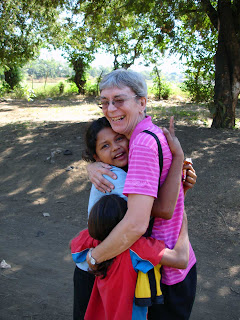“After great pain,
a formal feeling
comes.”
-Emily Dickinson
At Casita Memorial Park, north of Leon, Ebelina tells her story.
In 1998 she lived in El Porvenir, a village on the side of this volcanic mountain.
Several days of torrential rains had followed Hurricane Mitch. Then on October 30, she heard a loud rumble and ran outside to look for the helicopter.
Instead she saw a roaring wall of mud.
It surged through El Porvenir, burying her waist-deep, crushing three ribs, and breaking her cheekbones.
“That was a hard day,” she says quietly, then chokes up and pauses.
When she speaks again, her eyes are wet. “All around me I heard people crying out.”
For two days she heard adults and infants scream and moan and die. Over and over she calmed a child trapped near her, trying to help conserve his energy and prevent deyhdration.
Rescued by helicopter, Ebelina, a daughter, and a son survived. Her husband, a married son, his wife, and three children did not.
Three surgeries, a month of hospitalization, and relocation to Santa Maria followed.
Ebelina narrates with the impassive dignity of a woman who has weathered great pain.
After her story, we quietly walk the grounds. Beneath us, we learn, are the unrecovered dead. Each tree we see commemorates a family that is no more.
Coming down the mountain, we ask about her current life in Santa Maria. “I have a garden. I grow vegetables.” she says.
“What vegetables?” we ask.
“Maize (corn) and papayas.” Yes, in the dry season, she needs to water them. There is a well. Her son and daughter live with her.
As she talks, she smiles. In fact, she glows.
After great pain
has also flowed
grace.
-Written Thursday, January 28, while traveling with a team from Burlington, Ontario, Canada.
-Posted Sunday, January 31, upon return to email access.


















